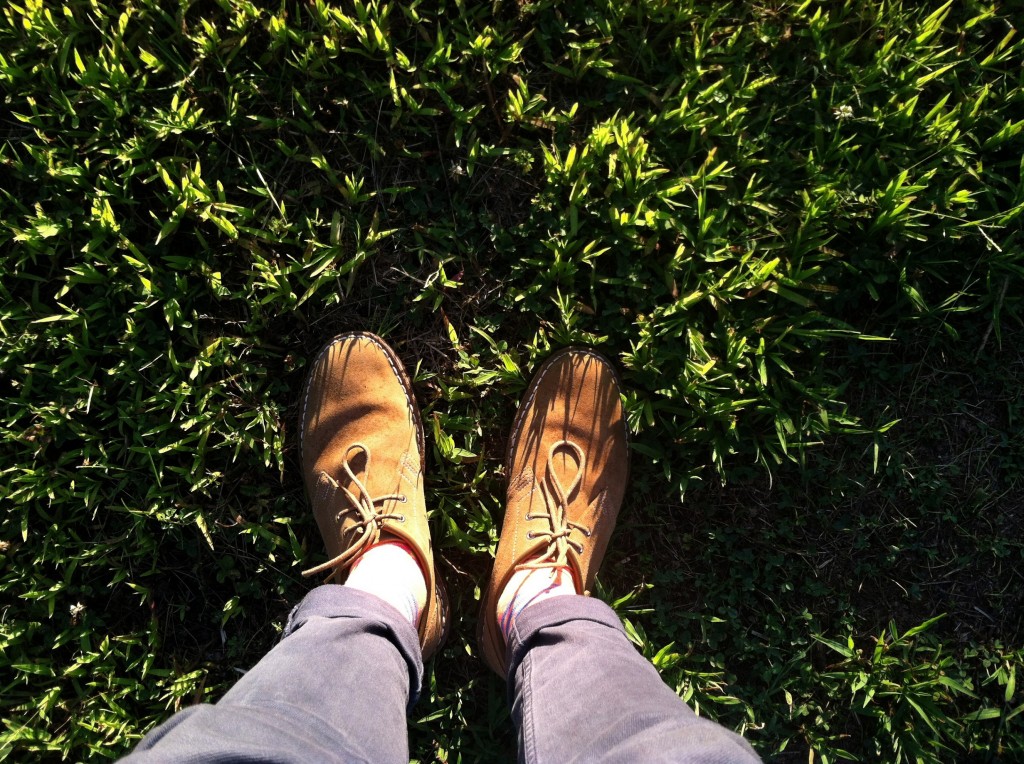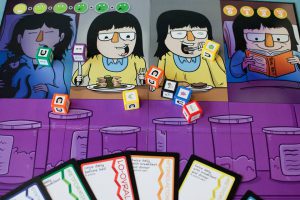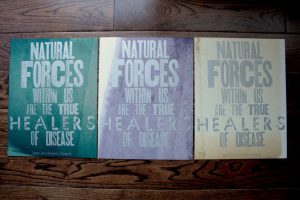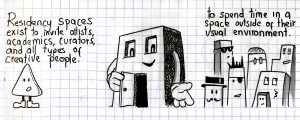A little over five months ago, I made the decision to leave my supportive community of friends, family, and colleagues in Chicago to pursue dreams and opportunities I believed I would immediately find in Los Angeles. More specifically, I was making this great venture for a job offer that would directly support my creative work as an artist and publisher. In the months before this opportunity was available, I would look at my present day-to-day as though it were offering me a test of sorts—a repeating dilemma—should I continue forth in my eclectic (and somewhat disjointed) variety of occupations, or do I make a drastic change in pursuit of the career I dream of having? You know, that whole “what I want to be when I grow up” thing. There was a feeling of self-conscious guilt in the months preceding my departure; I was doing my best to silence a voice in the back of my head that kept repeating “oh yeah, Matt, the grass is always greener on the other side…,” which, in this case, was California. But let’s first back up a bit to my arrival at my own initial grass that I was able to identify as green before there was any “other side.”
I think that I established a general sense of what I wanted to do with my life sometime around December 2012. The creative work I was pursuing felt more fulfilling than any work I had done before, the efforts I was putting forth were yielding results that I thought to be positive and influential, and I was having fun. Hard work felt productive and rewarding, meeting and collaborating with people felt special and important, challenges were met with excitement and enthusiasm. As soon as I had grown to understand what might be described as a “calling,” it began conflicting with the immediate demands of the jobs I work—standing on this grass, I became aware of a greener option. Though I am eternally grateful for the friendships that I’ve developed, the skills that I’ve learned, and the personal growth I’ve achieved through these jobs, none of these positions have directly or completely fulfilled my main career interests—you know, the one I want to be when I grow up. And even upon the grass I stand today, I continue to wonder what life would be like in what I consider to be the greenest grass: the work that fulfills my sense of purpose.
When one asks me “what do you do?” It is always complicated. I often end up rolling my response into answering two questions:
1. “How do you make money?”
2. “What kind of work feels healthy to you?”
My answers are as follows:
1. I make money by teaching, painting walls, installing exhibitions, working as a freelance assistant that completes a wide variety of tasks for artists, assisting photographers and cinematographers, doing sparsely requested design projects, a little bit of market research testing here and there, and occasionally selling handmade objects, furniture, books, and photographs.
2. I thoroughly enjoy publishing books that I sometimes make by hand, of which their success benefits the authors whose ideas make the book possible and influential. In other social projects, I try to make organizational decisions that create opportunities for individuals to voice their ideas openly, which I hope to have an influence of expanding awareness for the ways in which people experience life differently based on the active implications of our society.
“Oh, so you work in the arts.”
“Yes.”
I imagine that this dichotomous life of balancing work and passion exists in a wide variety of forms for the wide variety of arts-involved people. For me, the dichotomy has existed as an attempt to maintain a perseverant optimism that one day I will find stability in the work I find most fulfilling. In the meantime, I pursue job opportunities that offer a respectful work environment and engaging and socially productive conversations.
Pursuing the greener grass of personally fulfilling work has consistently led me to quite a lot of “maybe this is it – maybe this ______ (insert accomplishment / opportunity) will get me to where I want to be. For example, “maybe hosting this event at the MCA will get me to a place where the attention will come with interested donors and consequent stability” or “maybe this book I’m publishing will sell out and find itself in a lucrative second-edition-demand that will support my day-to-day life, and I’ll then be able to focus on the projects that are important to me.” Despite the excitement that occurs in these moments, I move through them in somewhat of a distracted state when this opportunistic draw for self-sustained stability is most desired. In my mind, security has figuratively existed as a falsely represented finish line: a place of comfort and ease that can be accessed through crossing a certain marker in your career, or perhaps that point comes to you sooner in the form of something that may look like a winning lottery ticket. In actuality, I’ve learned, the work that fulfills me is much more like a complex garden that comprises many elements of varying demands and resources; all of which change as often as the conditions that affect the garden.
I think that some of this finish line mirage that I admit to chasing has been informed by my experiences pursuing a creative career, such as discussing with my fellow college students about the lofty and conflicted concepts of “making it,” working jobs for several people who are their own bosses, and witnessing some of my peers and mentors sustain self-employment through their creative practices. I’ve also seen loved ones pass away abruptly and unexpectedly, some too young to fully comprehend. And I’ve labored below the poverty line to fulfill lunatical student loan expectations, working to the exhaustive point of physical illness in order to make monthly payments that will free me from debt some time in my sixth decade of life. Combined, these experiences have deeply affected the way I perceive living, and have led me to embrace “why not try?” and “why not now?” as I navigate decision-making in my life.
There are many ways to define “sense of self;” I relate it closely to my personal health. I consider making the effort to give myself the time and space for the work I enjoy an act of self-love, working toward a larger goal of sustaining a strong mental and emotional health. I would argue that when I am practicing the work I enjoy doing, I am most aware of my capabilities and personal identity, while my self-esteem is at a peak. I feel full of purpose and I am actively using skills that I feel to be important. My grass is at its greenest. When working jobs in which their ultimate purpose is to financially supplement the the work that I enjoy doing, the tasks at hand require a bit of loosening of my sense of self. The job requires me to temporarily forget or ignore my sense of purpose in order to maintain a reputation as a good and attentive employee who is prepared to serve the needs of the business. When the demands of these jobs impede on the ability to give myself time and space for my own work, it becomes apparent that my wellness is suffering. I don’t believe this can necessarily be blamed on the employer. Instead, it is a circumstance that exists when putting your efforts into a cause that is not your own, or your capabilities are being used in unhealthy ways and/or amounts. Agreeing to put the kind of effort into a job that impedes on my health is mostly my own fault; it is a choice that I made, whether subtle or not, where the option of putting my health first was always available – it may not have been popular with the business, and it may have had consequences, but it has always been an option.
Personally, I would classify a bad job as one where it requires me to put all of my skills of interest aside in order to ensure employment, while the work I do for the business is generally undervalued and/or I am perpetually disrespected. I would say a good job is where many of my skills of interest are utilized in the job’s tasks and I am mostly respected, and a great job would be where I am using all of my skills of interest, I am treated respectfully and acknowledged for the skills I bring to the position. Based on several conversations with creative peers, it seems that any one of these cases still poses a distraction to the work in which we feel to be most purposeful and rewarding.
Why do I stay in positions that distract what I would rather do? First, I am fearful of a poor outcome. Secondly, to rely on only myself requires me to truly believe that I am capable. On some days the latter is easy, and on other days it is very difficult.
In New Visions: All About Love, bell hooks addresses the relationship of fear and love in society:
Cultures of domination rely on the cultivation of fear as a way to ensure obedience. In our society we make much of love and say little about fear. Yet we are all terribly afraid most of the time. As a culture we are obsessed with the notion of safety. Yet we do not question why we live in states of extreme anxiety and dread. Fear is the primary force upholding structures of domination. It promotes the desire for separation, the desire to not be known. When we are taught that safety lies always with sameness, then difference [of any kind] will appear as a threat. When we choose to love we choose to move against fear–against alienation and separation. The choice to love is a choice to connect–to find ourselves in the other.
The element that resonates with me the most in this excerpt of bell hooks’ is the repetitive reminder of our ability to choose. I think that the choice of pursuing an art-involved career is one that comes with privileges. For the majority of my artistic pursuits, the gains have involved little risk or worry. Much of what we do as creative people is what we believe to be right or good, but that freedom of judgment may not be given to many other occupations. I remember as a child when an art teacher would tell me to just create something and that “there was no right answer.” In our adult creative pursuits, our purpose is often self-defined, and able to be abruptly shifted when we feel it’s necessary or sensible, i.e.: “I used to be a painter, now I’m mostly writing,” or “I was curating independently, now I’m starting my own organization.” These changes are mostly able to take place without warning or permission, a freedom that few occupations possess.
While some independence comes with our decision-making in the arts, I think that freedom can intensify feelings of a societal pressure to excel. All decisions are complicated because of emotions, fear, and social expectations. When preparing to make the decision to move to Los Angeles, I worried about potential future scenarios so much that I had solutions to problems that didn’t yet exist and still don’t today. But just in case, I’ll be ready, I thought. Months later, it feels silly to have analyzed so many possible outcomes before making a decision as an entirely new set of unpredictable circumstances followed my decision to move. I would love to be able to claim my transplant as a calculated, intellectual act of researched career strategy, but I’m afraid it was one of mixed and flawed desires, clouded by lots of conflicting emotions, and dealt directly with my desire to pursue the work I care most about.

Moving to Los Angeles involved the most risk, the greatest amount of emotional pain and financial worry that I’ve ever taken on throughout my creative career – my decision would cause a great amount of stress to the foundations I had established, cutting some of my roots and attempting to replant them in grounds I knew little about. Roughly 6 weeks after my first day at work, I was abruptly notified that I had lost the job, the greener grass, that I moved here for. For the month that followed that unexpected news, I tried to persuade myself and others that I could still make it work on my own creative projects but, as the money in my bank account dwindled to zero, I needed to find a new form of income. I worked a few odd jobs that friends were kind enough to offer, but I eventually found myself scrolling the Craigslist ‘Jobs’ section, silenced by the new reality of my displacement.
Like any pursuit, transition and unforeseen change will present inevitable challenges. I am currently doing my best to hold on to the idea that my skills are not something that are bound by location, while also acknowledging that adapting my skills and ideas to a new environment will take extreme care, continuous maintenance, and time. I can’t yet say that I have uncovered concrete solutions for my displaced grass, or developed reliable maintenance tips in proper gardening for a healthy artistic landscape. Instead, I am still processing the consequences of a deeply unexpected change while offering gratitude for the learning experience of pursuing my passion’s nourishment. Now five months after leaving Chicago to find work that fulfills me and my health, my current grass has undergone lots of stress and damage in a quick, whipping wind of non-ideal conditions. My grass is not at its healthiest moment—however, it is actively forming new growth and is nowhere near death. The ground I stand on has endured a new threshold of learned capability which has since impacted how I analyze its health.
I write this article as a novice who is still working toward creating a routine that yields healthy results. I am learning that the most important of my responsibilities, no matter the conditions, involve active dialogue with people I admire and respect; and that it is important for us to regularly check in with one another about our health. For three days of my week, I work a good job where I am respected and enjoy engaging conversations that are socially productive. For the other four, I garden.
 Matt Austin is an artist, educator, and publisher based in Los Angeles. The output of his creative practice ranges widely in form, but share a focus on the importance of honesty and learning from others. Inspired by failure and often motivated by fear, he demonstrates his enthusiasm for living by trying things out. He can be found online at www.mattislearning.com
Matt Austin is an artist, educator, and publisher based in Los Angeles. The output of his creative practice ranges widely in form, but share a focus on the importance of honesty and learning from others. Inspired by failure and often motivated by fear, he demonstrates his enthusiasm for living by trying things out. He can be found online at www.mattislearning.com
All images courtesy of the author unless otherwise noted.





